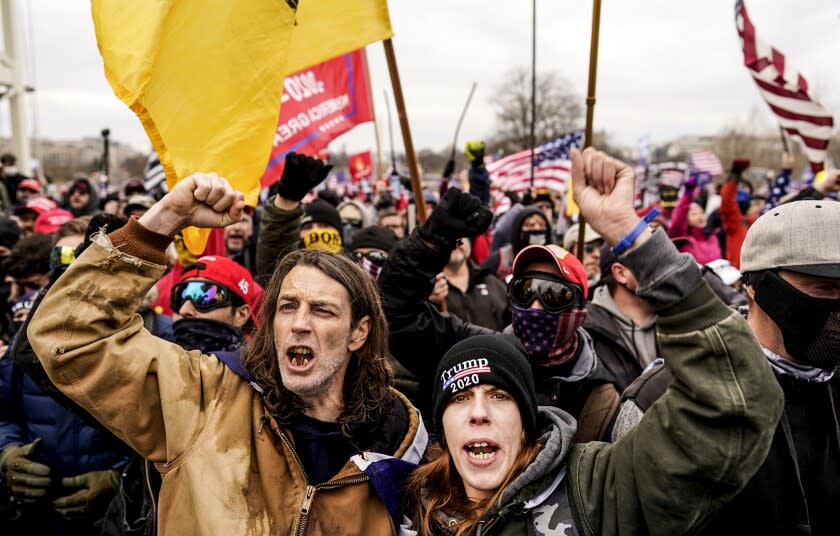Letters to the Editor: Can America share a common reality?

To the editor: I share David L. Ulin’s despondency over the state of our country, and I ask myself the same question: how to live responsibly amidst such division and turmoil?
It helped that last month I attended a family reunion in the conservative state of Iowa. Most of my family is liberal, but at those times I ventured outside the family circle — at the grocery store, church or a local diner — I found myself in the company of courteous and helpful people.
It all came together when we were saying the Lord’s Prayer at St. Mary’s Catholic Church in Spirit Lake. Since COVID, I haven’t been holding hands during the Lord’s Prayer, and most of the congregation at St. Mary’s wasn’t either. But toward the end, the little boy on my right reached out and put his hand in mine.
Truly I believe that the only way we’re going to come together in this country is to be with each other, letting each other’s innate goodness touch our hearts. The next time I am made angry or fearful by the other side, I’m going to remember my Iowa experience and, as best I can, respond with love.
Mary Bomba, Los Angeles
..
To the editor: Another powerfully inspiring essay by David L. Ulin. The answer to his pertinent question "Can we still find our truth in books?” when “We shall overcome” has turned into “You will not replace us” is a resounding "Yes!"
As a public school teacher of literature for 35 years, I am reminded of the books by our famous American author Mark Twain. In his classic novel "The Adventures of Huckleberry Finn," he creatively demonstrates in his chapters about the con artists known as the King and the Duke that most people will never admit that they have been duped. It's much too embarrassing. It's just easier to spread the "Big Lie."
David William Salvaggio, Redlands
..
To the editor: As much as society seems a "Mad Max" dystopia and each headline reads worse than the previous days', Ulin's essay seemed to miss one major lesson. Sure, crowds of activists storming the Capitol is a far departure from marches on the Lincoln Memorial. But those who study history know that reality is complicated.
Ulin bemoans the loss of "We shall overcome" without acknowledging that those who sang that song in marches faced dogs and water hoses. Now Americans chant "Black Lives Matter" through a fog of tear gas and riot shields.
Ulin references Nazi atrocities. No need to look overseas — the "Know-Nothing" party of the 19th century, America First Committee of the 1940s and many other movements in the U.S. before and after mirrored the most intolerant views of our day.
It is our painfully short memory and deeply rose-colored historical glasses in our country that make this period feel dire. Progress is never linear. One way we can help create a more objective and cooperative reality is to acknowledge the deep roots of our current events and remind ourselves: The sky is not falling today, and no one can predict the future.
Dayne Contarsy, Hawthorne
..
To the editor: Ulin is upset about the demise of public narrative, which helps society to identify extremist ideologies and to move forward with future goals. It is not news that our country's commons has thinned throughout the ages, especially the social mores. Gone are the years when God, traditional values and national holidays were observed in high regard. The average citizen probably associates the U.S. with just military power, free market, land of opportunity and resourcefulness of individuals.
Yet the COVID-19 pandemic revealed a fifth element: love of neighbor. This summer's blockbuster film "Top Gun: Maverick" illustrated some of those traits and brought me hope for a united country. I pray that as a nation, we nurture the few commonalities we still share and bring back those we have lost.
Raul Ramirez, Azusa
..
To the editor: I agree with Ulin that our nation appears to be divided into warring ideological camps with seemingly irreconcilable differences. However, these deep divisions did not all occur by accident. They serve a purpose for those who see human life as a quest to accumulate as much wealth and power as possible in a single lifetime. To accomplish this, they have to divide the rest of us into warring ideological camps so we never look at those who benefit by creating these deep divisions that put an increasing number of Americans in homeless encampments.
Human greed, ensconced in political power to benefit the few rather than the many, is the single greatest reason for the decline and collapse of all nations throughout history. It is happening here, just as it happened in so many other civilizations now buried beneath the sands of time.
Dennis Clausen, Escondido
This story originally appeared in Los Angeles Times.

